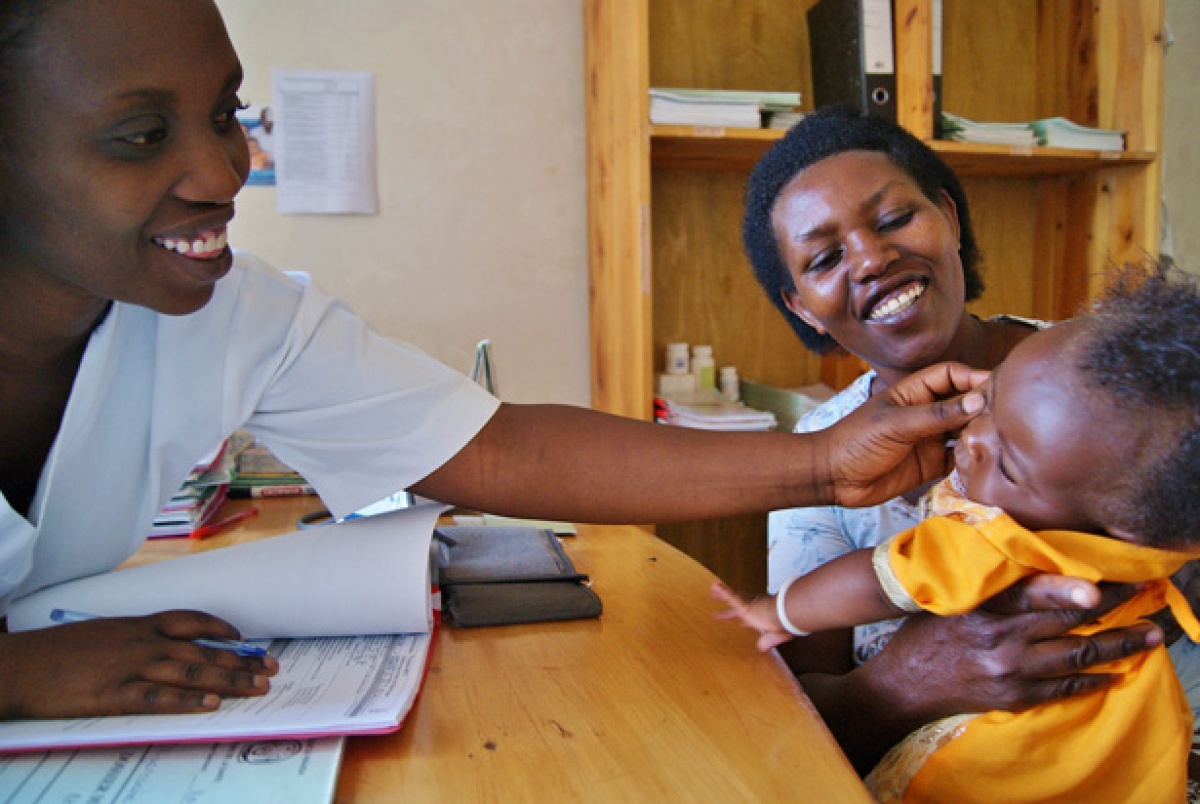Combined Clinics Help Combat Mother-to-Child HIV Transmission
Christine Niyonsaba came to the Karama Health Center in eastern Rwanda recently with her infant daughter in her arms, ready for their monthly check-up. The 44-year-old mother of eight is HIV-positive.
Posted on Dec 19, 2012

Once inside the clinic consultation room, Nurse Solange Bazirete weighed Niyonsaba, measured her blood pressure, and took her CD4 count (a measure of immune system strength) before asking a series of questions: Do you take your antiretroviral medicine every day? Do you have any side effects? Does the community health worker come every day?
Bazirete moved on to a squirming Iratuzi, checking the infant's weight and nutritional status and continuing with her questions. Is Iratuzi getting her medicine every day? Is she sleeping under a bed net? Is she up to date on her vaccinations?
At the end of the consultation, Bazirete wrote the next appointment date in a small notebook Christine carries that contains her CD4 counts, appointments, and measurements.
Without treatment, a mother with HIV has a 41 percent chance of transmitting the disease to her newborn infant. However, with new medication regimens and proper medical care, it’s possible to reduce this chance to less than 1 percent.
To achieve that goal, PIH/Inshuti Mu Buzima has created “combined clinics” like the one Niyonsaba and Iratuzi are visiting in this rural village. Called Clinique Combiné, the clinics provide a one-stop medical home in which HIV-positive mothers and their newborn infants can receive care in a single place. This makes it easier for mothers to access services, which improves treatment adherence and retention, reducing the transmission of HIV and maximizing their infants’ growth and development.
It can also take a full day and a week’s wages to travel to a clinic in rural Rwanda, so it’s important that mothers receive the maximum possible care in one monthly visit.
“At IMB, we’re committed to not only preventing the transmission of HIV from mother to child, but we’re striving to eliminate new cases of childhood HIV altogether,” said Dr. Felix Cyamatare, IMB’s director of clinical programs.
In partnership with Rwanda’s Ministry of Health, IMB has established 37 of these clinics at rural health facilities across three districts, starting in November 2010. The clinics integrate services that had previously been offered separately: maternal HIV services, infant services, family planning services, and maternal, newborn, and child health services.
At the “combined clinics,” HIV-positive mothers receive support that includes post-partum care, antiretroviral medication, CD4 testing, breastfeeding support and education, family planning information, nutritional support, and psychosocial services. Their children receive post-partum care, tuberculosis and malnutrition screening, malaria prevention, and continued testing to determine HIV status. Both mother and child receive regular visits at home from a designated accompagnateur. And for those who can’t afford to pay, the costs are covered through IMB’s support of Rwanda’s mutuelle (national health insurance) program.
IMB-supported combined clinics have served more than 1,000 mother-infant pairs since October 1, 2012, and achieved an overall rate of HIV transmission to these infants of less than 2 percent, which achieves Rwanda’s targets for elimination of mother-to-child-transmission. Across sub-Saharan Africa, 17 percent of infants born to mothers with HIV still become infected with the virus.
“This model is one of a kind in sub-Saharan Africa and shows that integrating many services into one point of care is, in fact, possible,” said Dr. Neil Gupta, director of IMB’s infectious disease program. “This has never been done before, and the Rwandan government is interested in scaling up this model for the entire country.”
The combined clinics are just one part of IMB’s broader work to prevent mother-to-child transmission of HIV (PMTCT).
Since 2005, IMB has delivered lifesaving care to HIV-exposed children. Children receive HIV treatment, routine vaccinations, treatment for diarrheal disease, nutritional support to treat and prevent malnutrition, and their families receive home visits and socioeconomic support.
A recent IMB study published in the Journal of Acquired Immune Deficiency Syndromes found a fourfold increase in the number of infants enrolled in the PMTCT program from 2007-2010. During that time, IMB enrolled 1,038 infants, of whom only 27 tested positive for HIV. One of the 27 children died, and none were lost to follow-up. Of the pregnant women enrolled in the program, 94 percent delivered their babies in a health facility, where they received care and medications that prevent HIV transmission during delivery, and 99 percent of the infants received medications to prevent HIV transmission after delivery.
Additional PMTCT innovations include the development of a new electronic medical records system that registers all infants born to HIV-positive mothers, which allows staff to track down any children who miss appointments or have adverse outcomes. IMB also has developed expert nurses in PMTCT who provide ongoing mentorship and training to health centers. Rwanda’s Ministry of Health is currently adopting these models for the national PMTCT program.
“Together, IMB and the Rwandan Ministry of Health are showing that elimination of mother-to-child transmission of HIV—and an AIDS-free generation—is possible,” said Gupta. “And for mothers like Niyonsoba, that possibility is already becoming a reality.”

